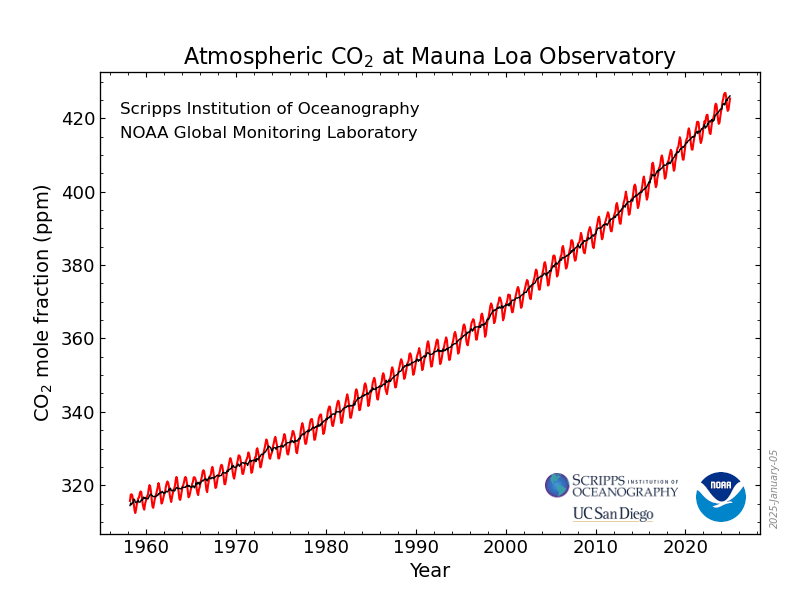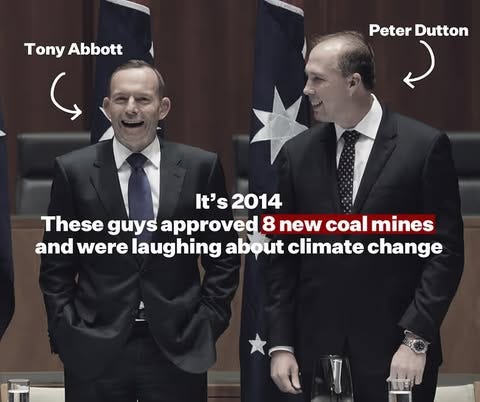Hello 2025. And why the world is noisy and our brains feel busier than ever.
Don't miss the video at the end of this post
Happy New Year from #Changing language in the climate crisis. I’m returning from my little hiatus feeling … hmmm … like even language is struggling to keep up with the pace of change. Of course language is not actually struggling at all - inside language is the stuff that generates all of the noise clogging up our little universes.
If I had to give you one word for how I feel as 2025 has opened for business, it is guilt. I’ve lived a privileged, fossil-fuel enhanced life, without too much to worry about.
But now I see so many young people who will live many more years of climate chaos than me shouldering this terrible burden and feeling fear and anger. If you haven’t yet made a new year’s resolution to be active about defending the climate and the future of next generations, check out this reel from one of the dynamic young leaders of Rising Tide in Australia, Alexa Stuart, on hearing the news that the Trump has pulled the US out of the Paris Climate Agreement:
It’s heartbreaking, but she is also very inspiring. And hopefully Alexa has seen the recent commitment by Bloomberg Philanthropies to cover the funding for the UN’s Climate Budget that Trump has withdrawn.
If you need further encouragement to act, take a look at the bravery of these protestors, many of them young people, who risked arrest to stop a coal train heading to Newcastle, after the Australian government approved more new coal mines in September last year. The arrestees faced court about 10 days ago. The magistrate told them to go ‘hold a banner in a park’.
This is well-known new dialect of English called ‘boomer-ese’, a term I thought I’d just invented, but found it on a blog about leadership. As the blog indicates, you don’t have to be a boomer to talk like one. I don’t know how old this magistrate is, but telling young people how to protest about climate is patronising. They have so much more at stake. And they know, because they have to, that holding a banner in a park won’t change anything.
Instead of holding up a banner, you will see them in the post above doing something much braver: standing on top of a big dirty pile of dirty coal. It’s an attempt to get a very clear message through in a world dominated by noise. Not random noise though - noise designed to preserve old fossil fuel power and money, as research by Professors Jeffrey Supran and Naomi Orestes shows. This noise has been carefully crafted for decades, with slight variations on this cacophany of predatory climate messaging as time goes on, and as climate awareness grows.
From telegraph to social media
This very noisy world feels like it gets bigger and louder everyday. The expansion is partly due of course to the proliferation of communication technologies which have radically changed humans’ relationship to time and space. As revolutionary as it is to be able to post the art on your cappaccino to your followers and fans, even the telegraph - social media’s humble ancestor - shook up the world. In 1841, the news of the death of the US’ ninth president, President William Henry Harrison, took three months and 20 days to get from the east coast of the US to the west coast.
Just three years later, telegraph technology was able to relay a message via Morse Code almost instantaneously across a line installed between Washington and Annapolis Junction - not very far apart, but far enough to test this new technology. Mitchell Stephens very interesting book A History of News reports a telling comment from James Gordon Bennett, the then publisher of the New York Herald, who recognized the political implications of telegraph technology for news:
No better bond of union for a great confederacy of states could have been devised ... The whole nation is impressed with the same idea at the same moment. One feeling and one impulse are thus created and maintained from the centre of the language to its uttermost extremities.
‘What has happened to space'?’, Bennett’s newspaper would ask. It’s answer: it has been ‘annihilated’. By 1866, an underwater telegraph cable permanently connected American and England. Instead of weeks or months to send a message between London and New York, it could not only be received in minutes, the same message could be sent far and wide, enabling holders of this technology to homogenize human minds, well before Facebook and Twitter came on the scene.
The semiotic ‘Big Bang’
Expanding technology has been crucial to creating our modern noisy world. But it would not have happened except that language is also completely open and expansive. It wasn’t always this way. But humans pushed and pulled language, until we made it become something new. A very very long time after the original Big Bang, human conversation powered the ‘semiotic Big Bang’, where we turned language into something that can endlessly generate new meanings. In this process, language became something no longer bounded by physical time and space. It had a new substance inside it, that meant humans could go on making and remaking their little worlds endlessly.
You’ll never guess what that new substance was. Let me leave you in suspense and see if any of you can guess. The point is, our current endless parade of stories, narratives, memes, ideologies, mythologies, excuses, lies and half-truths about climate are thanks to the inner workings of language. The torrent of blah blah blah and the ongoing yadda yadda yadda, all to stop people from understanding the impact of the rising CO2 and other greenhouse gases on our planet, is all thanks to language.
Source: https://gml.noaa.gov/ccgg/trends/
For example, when Rising Tide activists stopped the coal train, the relevant Member of Parliament, Mr Dan Repacholi, defended not the climate but his government’s ongoing support for coal by saying:
Coal mining produces the power, produces the steel, to make these renewable projects actually happen.
If you want the rebuttal for why we ‘have to’ burn coal for steelmaking, read this piece published in Crikey in 2023. Just for starters, it turns out the planet doesn’t care about why we burn coal. But how about telling these protestors we have to have coal-generated electricity to have renewable energy projects? Wow.
Or what about this bit of blah blah blah from the Federal Environment Minister, Tanya Plibersek, claiming that the current Labor government approved no new coal mines in 2024.
‘No new coal mines’. Sounds like a rock-hard fact, doesn’t it. A coal mine is a coal mine is a coal mine - right? What could be simpler? But last year her government approved 7 new coal mines. So what gives?
A ‘new coal mine’ in the universe that our Environment Minister inhabits has to also have a new owner to be new. Othewise, it is just an ‘expansion’ of an existing coal mine.
Zack Schofield from Rising Tide responds to Environment Minister’s claim she had not approved any new coal mines in 2024
You’d think something as concrete and tangible as a coal mine would not be subject to the malleability of language. But you’d be wrong. And it’s because of that magic stuff we put inside language some thousands of years back. The yadda yadda yadda from the Environment Minister insisted not just that these were not ‘new mines’, but that her approval was conducted on case-by-case basis based on the law, as in, environmental law. According to her spokesperson:
The Albanese government has to make decisions in accordance with the facts and the national environment law — that's what happens on every project, and that's what's happened here.
The ‘facts’ in this case appear not to include any scientific ones. The Greek sophists, from whom we take the word ‘sophistry’ would give Minister Plibersek 5 stars for this.
Disinformation on steroids
Disinformation isn’t new. It is only the old school philosphers and linguists who cling to some romantic idea that language is for expression of a true and universal ‘reality’. These old white males, as they mostly are, have done us all a dis-service by distracting us from the ways that meanings make our world.
The new tech has helped humans expand the space between some piece of calibratable experience - the rising rising CO2 in our atmosphere - and our construals of that experience. Sociologists - at least some anyway - will tell you whatever is happening here has been a long time in the making. We live in the modern age, and one of its features is a much greater capacity to create and circulate content. Hand in hand with the opening up of democratic processes in the period we now call ‘modernity’ comes high levels of literacy and the arrival of nation state languages, which reach all corners of a polity. Religion declined as a means of social cohesion, and in its place have come our secular religions - OK, still lots of space for religious doctrine too, which seems to be on the rise. These secular discourses are ‘competing for the allegiances of ever more politicized and ideologised populations’, as argued by the sociologist Professor Siniša Malešević.
So, we are more politicized and ideologised than we have ever been. Our brains are constantly navigating the swirling discourses that have even more intimate penetration into our daily lives than has been possible before. This means there are more and more interests competiting for a slice of your attention and to insinuate themselves into your habits of mind. It’s hard to get a break from it.
Which is why holding a banner in a park is not an effective mechanism for trying to stop the planet burning. In fact in the face of the tsunami of climate disinformation, the most rational thing is to stop a coal train, and to try to stop coal ships.
My climate new year’s resolutions
Try to get climate into more of my everyday conversations
Think about whether I am ready to get myself arrested in a climate protest in support of the many young people putting themselves on the line
Bring you the new words that might help shake off old thinking so you can become ‘natives of now’ - my favourite new phrase from Alex Steffan, writing at The Snap Forward - check out this post on how ‘old thinking will break your brain’
What are your climate resolutions for 2025? Let me know in the comments. If you need more motivation, check out this new video from Parents for Climate, with this great slogan ‘Protect What you Love - Act Now, Later is Too Late’.
Click here to donate to get this video circulating more widely.
Thanks for reading. For 2025 I will be publishing on a monthly schedule. I need more time to read, think and process what is happening and what is coming. I want to be able to bring you climate and language posts that are more considered and thoughtful.








Love this post! I don't have a resolution per se but I've had a guiding motto that if my climate advocacy work & my writing is causing privileged men to get angry with on the internet, I'm probably heading in the right direction. I'm also reclaiming the label of hysterical/radical feminist as a badge of honour.
Great post! I think it's really worthwhile to think about the forms of protest we can do. I admire my friends who door knock in a capital city. I'm in a very small town and eternally wondering if I could give it a go. In the meantime I'm also trying to have more conversations about climate change with as many different people as possible.